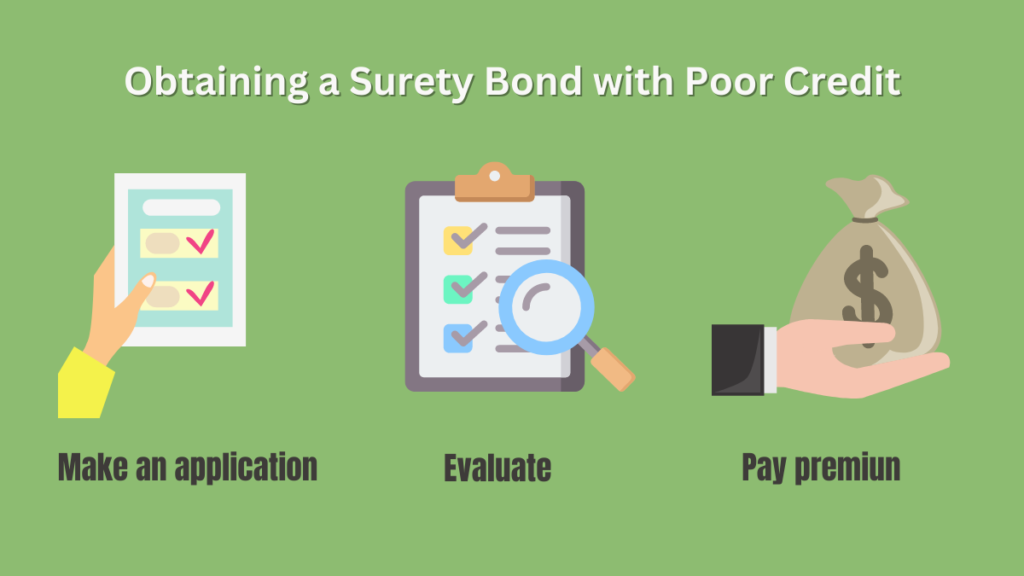Surety bond bad credit
You are not automatically disqualified from becoming bonded just because you have a low credit score owing to tax liens, foreclosures, or other bad reports. There are several assurance businesses that are willing to work with you by providing a bonding program designed specifically for persons who have poor credit.
Occasionally, people’ and companies’ credit scores may get harmed as a consequence of tragic situations that are almost hard to prevent. This can place you in a position where it is practically impossible to acquire any form of credit or the type of bonding you need.
Getting the necessary bonds in order to run a business is crucial. Beginning a company requires certain types of bonds, and in order to compete with other contractors in the market, you need to have certain bonds in place.
It’s possible that you believed a poor credit score would prohibit you from receiving the bonds you want, but that’s not always the case. In spite of the fact that your company has a low credit score, there are still certain agencies that are prepared to offer bonds to businesses with poor credit.
If you have poor credit, getting the bonds you want will often cost you extra money, but if you look hard enough, you may still find a surety firm that will let you be bonded so that you can legally operate a business.
Whether you want to believe it or not, the procedure of acquiring a surety bond as an applicant with poor credit won’t be all that unlike the approach that is followed by someone with excellent credit. After you have finished filling out the application for your surety bond, the next steps of the procedure will be determined by whether or not your bond is an immediate issue or an underwritten bond.
While applying for an instant issue bond, you won’t need to worry about having your credit checked to determine your premium since all applicants are charged the same amount for the bond. You won’t have to go through the underwriting process, which means you’ll get a significantly faster response to your quotation request and will already be authorized for the amount that the surety has determined.
Notary bonds, bonds for organizations that provide commercial services, and bonds for cleaning services are all examples of common types of bonds that may be issued instantly. Bonds that can be issued instantly are subject to a more streamlined application procedure than those that need underwriter scrutiny.
A “soft credit check,” also known as a “credit preview,” is when underwriters look at your credit history to get an idea of where it now stands. So once again, you shouldn’t be concerned about your poor credit. Your credit history will just assist in determining which market you are a part of and whether or not we will be required to evaluate any extra paperwork.
For instance, in order to acquire a more accurate understanding of your circumstances, surities may need additional documentation, such as personal or corporate financial documents, in addition to reviewing your credit report. From this point, the application you submitted for the surety bond will be examined in its entirety in order to calculate your premium.
Obtaining a surety bond with poor credit
Making an application for a surety bond with low credit is a reasonably easy procedure, and it does not vary much from the standard process in any significant way. You will generally be required to apply specifically under a poor credit program that is offered by a surety company.
Once your application is received, the surety company will be notified to evaluate your actual creditworthiness and to calculate a monthly premium which would be fair, given the higher risk that is involved.
Your application has to be evaluated in the high-risk category because it is presumed that, as an individual with poor credit, you are more likely to cause conditions that would trigger claims against the bond, and that you are also more likely to default on paying that claim out when it is made.
Additionally, it is assumed that you are more likely to cause conditions that would trigger claims against the bond. These assumptions may perhaps be wholly false and unsuitable in your instance, but they are legally backed, and will always come into play when your credit score falls below a particular level.
In any event, an estimate of the premium that has been computed will be provided to you, and you will then be given the choice of whether or not to accept that evaluation. In such a case, all that will be required of you is to sign a contract and make the first payment on the premium before you will be given the bond that you need.
Your bond program will stay in effect for the whole of the time period that was agreed upon as long as you continue to make the required premium payments on a consistent basis.
